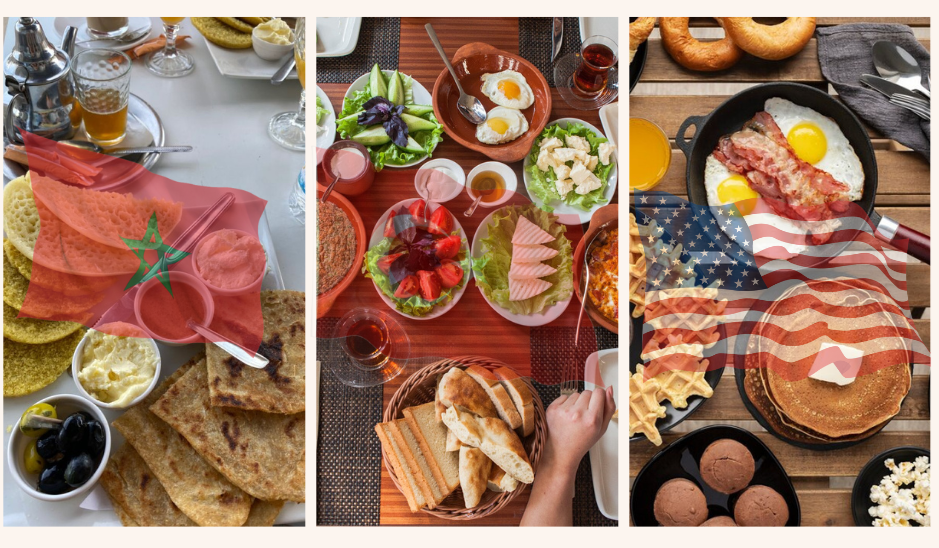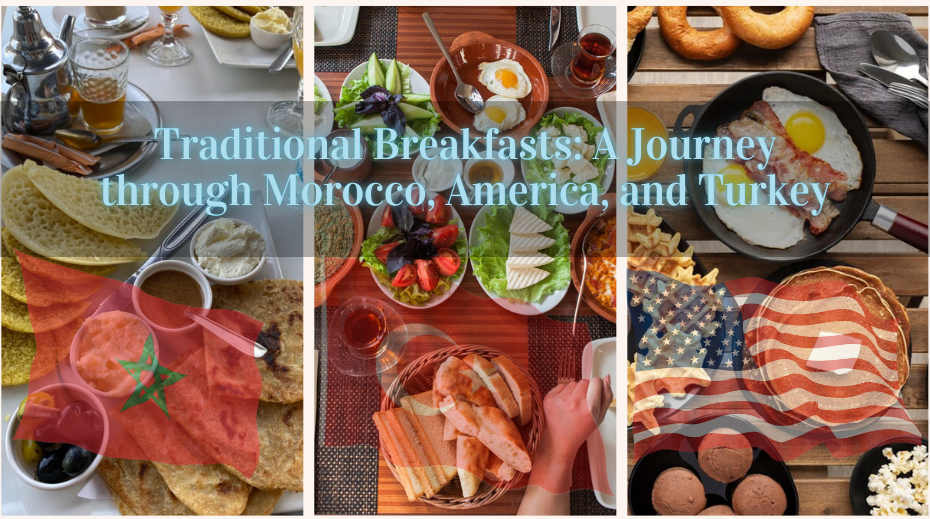Breakfast is more than a simple meal. It’s a cultural experience that can differ dramatically from one place to another, reflecting the unique ingredients, tastes, and traditions of each region. In this blog post, we’ll explore what makes breakfast traditional in Morocco, America, and Turkey, each offering a delicious and memorable way to start the day. Whether you’re interested in a hearty Moroccan meal, a comforting American breakfast, or a social Turkish spread, these traditions reveal a lot about the culture behind the cuisine.
Why Breakfast Traditions Are So Important
Breakfast traditional meals go beyond food; they symbolize hospitality, health, and even history. Each of these breakfasts offers a special insight into local life. In Morocco, breakfast is about warmth and richness; in America, it’s often a quick yet satisfying meal; in Turkey, it’s a chance to connect with family and friends. Each style has something unique to offer, making breakfast traditional an enjoyable and meaningful way to start the day.
Moroccan Breakfast: A Flavorful Feast
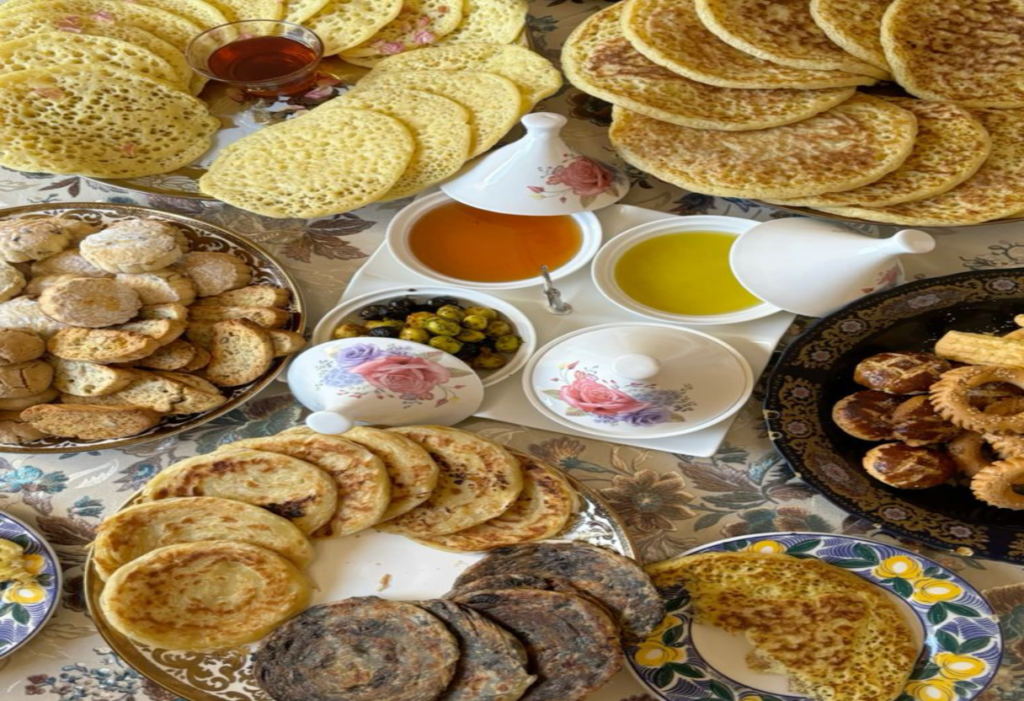
A traditional Moroccan breakfast is both hearty and flavorful, bringing together a variety of tastes and textures. Moroccan breakfasts commonly include:
- Khobz (Bread): This staple Moroccan bread is served fresh, sometimes with honey or olive oil, making it versatile for both savory and sweet pairings.

- Amlou: Amlou is a rich, nutty spread made from almonds, honey, and argan oil, adding depth and flavor to breads.
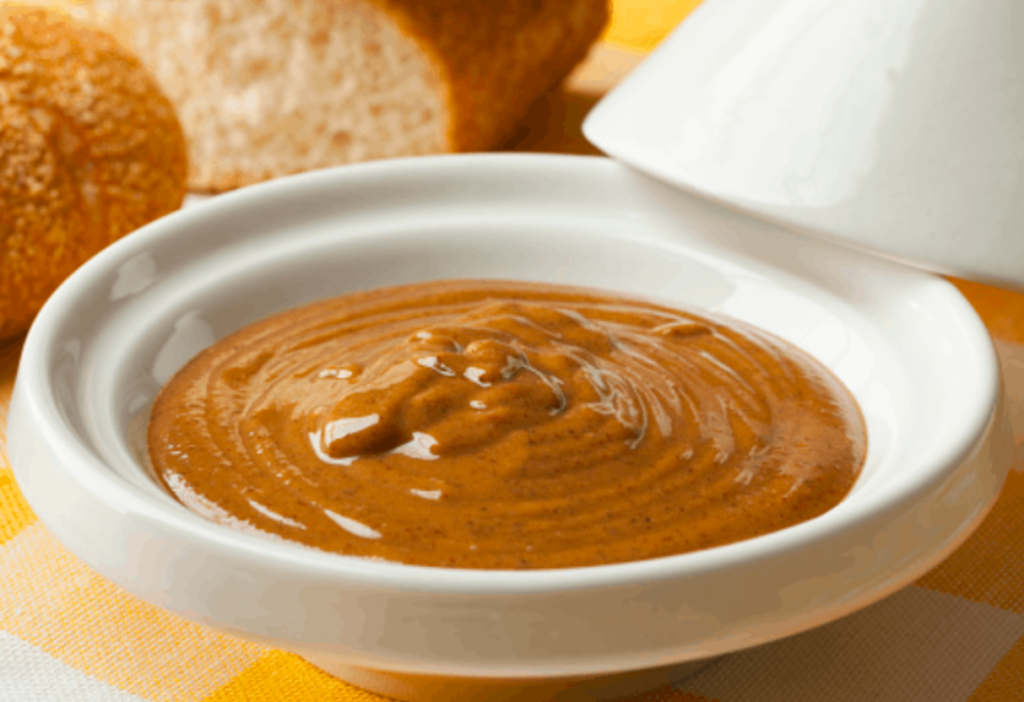
- Msemen and Baghrir: These Moroccan pancakes are loved for their distinct textures. Msemen is a flaky, layered pancake, while baghrir, also known as “thousand-hole pancake,” is spongy and perfect for soaking up spreads.
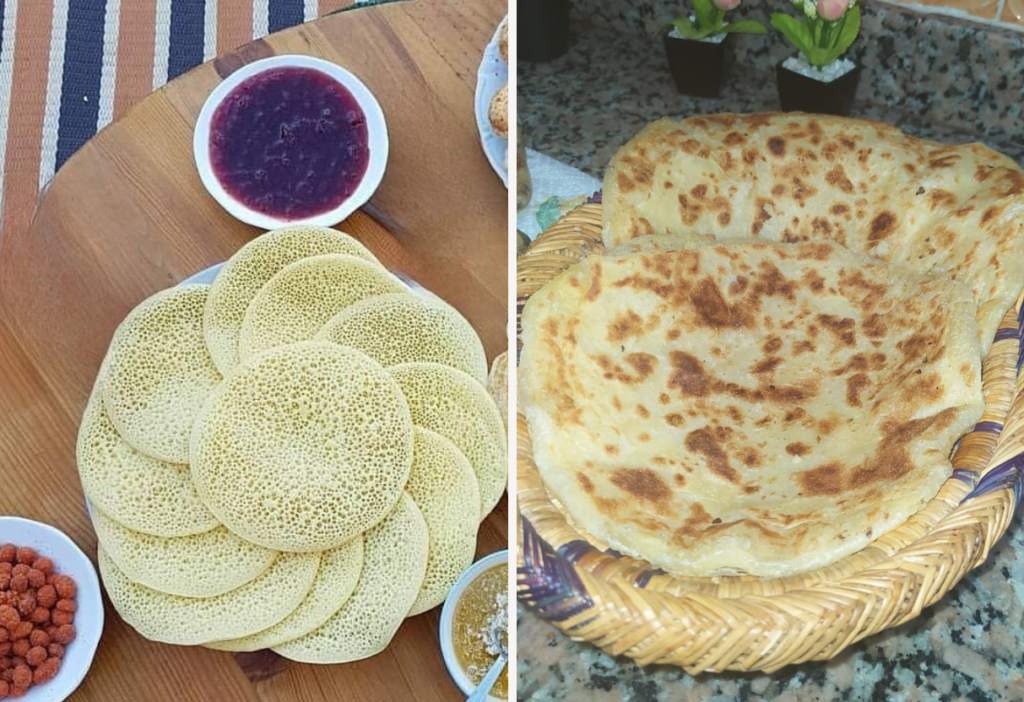
- Olives and Cheese: Moroccan breakfasts often include olives and local cheeses, giving a savory balance to the meal.
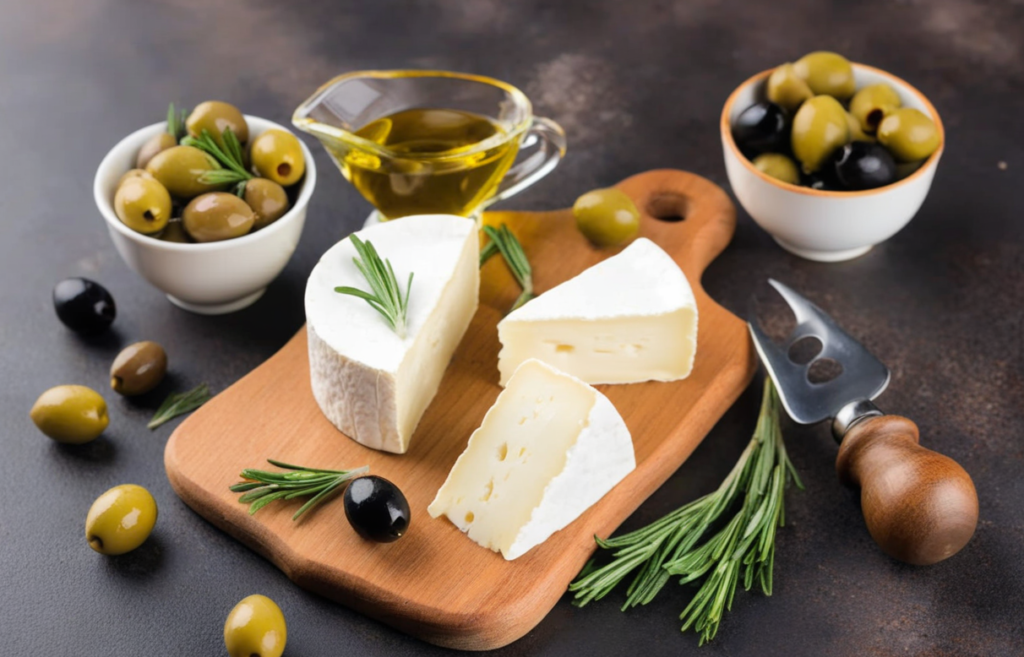
Moroccan breakfast is served with strong mint tea, which has a deep cultural significance. The tea adds a refreshing element and is traditionally enjoyed as a symbol of hospitality and warmth.
American Breakfast: Pancakes, Omelets, and Everything in Between
American breakfast is known for its diversity, offering both hearty and quick options. Some classic components of an American breakfast include:

- Pancakes or Waffles: These popular breakfast items are typically served with butter and maple syrup, creating a perfect balance of sweet and savory flavors.
- Eggs: Eggs are a staple of American breakfast, served in various forms like scrambled, fried, or in an omelet with vegetables or cheese.
- Toast and Hash Browns: Toast with jam and crispy hash browns are popular sides that add flavor and texture to the meal.
- Cereal or Oatmeal: For a lighter breakfast, many Americans enjoy a bowl of cereal or oatmeal, which can be topped with fruits, nuts, or honey.

Coffee is the go-to beverage for most Americans, often paired with orange juice for an energizing start to the day.
Turkish Breakfast: A Social and Flavorful Spread
In Turkey, breakfast is a social affair, known as “kahvaltı.” It involves a wide array of foods that create a beautifully balanced and flavorful spread. A traditional Turkish breakfast often includes:
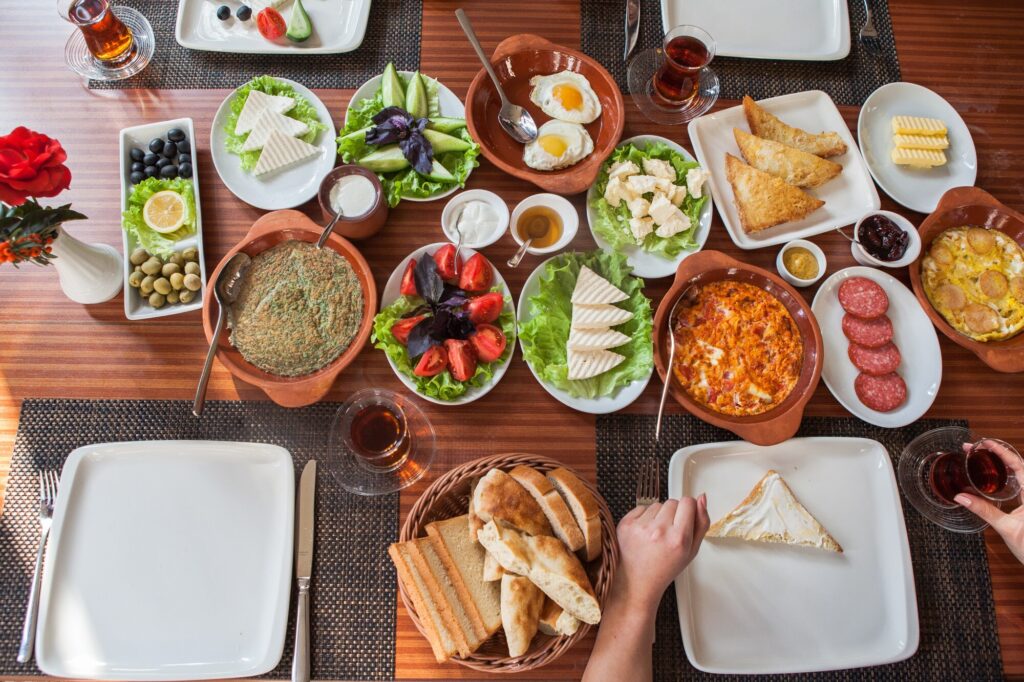
- Simit and Bread Rolls: Simit, a sesame-crusted bread ring, pairs wonderfully with fresh bread rolls.
- Cheese, Olives, and Tomatoes: Turkish breakfasts include an assortment of cheeses (like beyaz peynir, similar to feta), olives, and fresh tomatoes for a savory, refreshing flavor.
- Menemen: Menemen is a Turkish-style scramble with tomatoes, peppers, and spices, adding a warm and slightly spicy note to the spread.
- Jams and Honey: Sweet jams and honey, often served with clotted cream, provide a touch of sweetness.
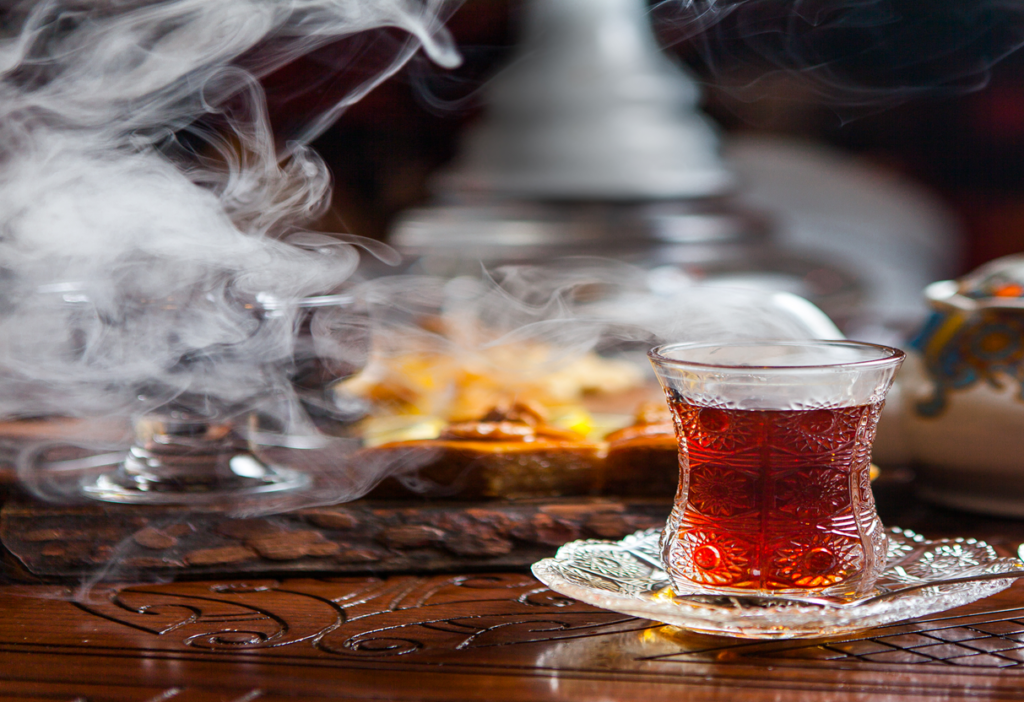
A Turkish breakfast is typically enjoyed with strong black tea served in small tulip-shaped glasses, fostering a sense of togetherness and relaxation.
- Understanding the Cultural Differences in Breakfast Traditions
Each country’s breakfast reflects its cultural priorities. Moroccan breakfasts showcase the country’s love for warm, aromatic dishes that highlight local ingredients like almonds and olive oil. American breakfasts, on the other hand, often focus on quick, filling options that suit a fast-paced lifestyle. Turkish breakfasts encourage a slower pace, celebrating shared meals with family and friends over a variety of flavors. Breakfast traditional in each of these cultures provides insight into daily life and values.
- The Heritage and Importance of Breakfast Traditions
Breakfast traditional meals hold cultural significance, representing a connection to the past. Moroccan families often use recipes handed down through generations, while Turkish families may add their own twist to classic dishes like menemen. Traditional breakfasts give people a chance to reconnect with their roots and share a bit of their heritage with others.
- Health Benefits of Traditional Breakfasts
Each breakfast offers unique health benefits that reflect the ingredients and lifestyle of each culture:
- Moroccan Breakfast: Almonds, olive oil, and other nutrient-rich ingredients make Moroccan breakfasts heart-healthy, providing essential proteins and good fats.
- American Breakfast: Options like oatmeal provide fiber, though some American breakfasts, such as pancakes, are high in sugar.
- Turkish Breakfast: The fresh vegetables, cheeses, and whole-grain breads common in Turkish breakfasts offer vitamins, fiber, and healthy fats, contributing to a balanced meal.
- How to Make a Moroccan Breakfast at Home
To enjoy a Moroccan breakfast, start with fresh bread like khobz or prepare msemen, a flaky pancake. Pair these with olives, cheese, and a rich cup of Moroccan mint tea. This combination captures the essence of Morocco’s warm hospitality and distinctive flavors.
- How to Make an American Breakfast at Home
To recreate an American breakfast, try making a batch of pancakes or waffles, scrambled eggs, and crispy hash browns. Serve with a cup of coffee and a glass of orange juice for a classic American start to your day.
- How to Make a Turkish Breakfast at Home
For a Turkish breakfast, arrange a spread with simit, fresh tomatoes, olives, and beyaz peynir cheese. A small portion of menemen with tomatoes and peppers will add the warm, spicy touch that makes Turkish breakfast special. Don’t forget to serve it all with black tea for authenticity.
- Embracing Breakfast Traditions
Exploring traditional breakfasts lets you experience the unique flavors and values of different cultures. Each style Moroccan, American, or Turkish offers a special way to start the day, from Morocco’s warm and flavorful feast to Turkey’s communal spread and America’s balanced mix. Embrace these traditions and find a new favorite breakfast along the way!
- Frequently Asked Questions
1. What is included in a traditional Moroccan breakfast?
A Moroccan breakfast usually includes bread, olives, cheese, msemen (layered pancakes), baghrir (spongy pancakes), and refreshing mint tea.
2. How is a Turkish breakfast different from an American breakfast?
A Turkish breakfast is often a social occasion with a large spread, including cheeses, olives, and fresh vegetables, while American breakfasts are generally quicker, featuring items like eggs, toast, and coffee.
3. Can I make a Moroccan breakfast at home?
Absolutely! You can prepare a Moroccan breakfast at home with fresh bread, olives, cheese, and a pot of mint tea. Including Moroccan pancakes like msemen adds a traditional touch.
4. What are the health benefits of a Turkish breakfast?
A Turkish breakfast is balanced and often includes fresh vegetables, whole grains, and cheeses, which provide essential nutrients, fiber, and protein.
5. Why are traditional breakfasts significant in many cultures?
Traditional breakfasts reflect cultural values, family traditions, and a sense of heritage, connecting generations through food and offering a unique glimpse into each culture’s way of life.
By exploring these breakfast traditions, you can bring a bit of the world to your morning table, discovering new flavors and connections in each dish. Enjoy creating your own breakfast traditional with a taste of Morocco, America, or Turkey!
